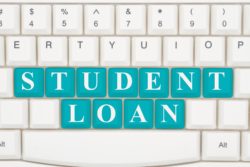
If you have student loan debt and are unable to pay off your balance, there may be legal options available to help you. In some cases, student loan bankruptcy may be an option if debtors can prove that the debt imposes an undue hardship on them and their family.
What is Bankruptcy?
Bankruptcy is a legal process that individuals or businesses may file when they are unable to repay their debts. People who choose to file for bankruptcy may be able to free themselves from their debts, although the cost of doing so may be high. While bankruptcy may wipe out a debtor’s existing debts, the debtor’s assets may be used to pay off a portion of the amount owed. Additionally, bankruptcy remains on your credit report for between seven and 10 years. This may prevent you from opening new lines of credit, taking out loans, or obtaining a mortgage.
There are two types of bankruptcy a debtor seeking to cancel student loan debt may file. Chapter 7 bankruptcy is for individuals or businesses with few or no assets. This type of bankruptcy allows people to discharge unsecured debts, including credit card bills, medical bills, or student loan debt by paying off a portion of the debts with their assets. If you have no valuable assets and do not own property that qualifies for seizure under bankruptcy, you may not have to pay any part of your debt. If you do have assets, including family heirlooms or other items of high value, second homes, cash, or stocks, you may have to sell these assets in order to clear your debt.
Chapter 13 bankruptcy is for people who make too much money to qualify under Chapter 7. Individuals who file Chapter 13 bankruptcy are able to work with the court to create manageable debt repayment plans. These plans involve regular payment installments, usually over the course of three to five years, and allow debtors to discharge their debts without selling their property or possessions.
Although it costs money to file for bankruptcy, it may be worthwhile for people who are able to successfully cancel their student loan debt. The average cost to file Chapter 7 bankruptcy is $1,200. The average amount of student loan debt in the U.S. is $31,000, according to credit.com.
How Much Student Loan Debt is There?
The total amount of student loan debt carried by Americans is $1.64 trillion. Approximately 45 million people have some amount of student loan debt, and some 11 percent of these people are delinquent or in default, meaning they have failed to make payments on their loans for at least 90 days, studentloanhero.com reports.
Each year, 250,000 people with student loan debt file for bankruptcy. However, most of these people do not attempt to have their student loan debt canceled and instead focus on discharging credit card debt or other debts. This may be due to misconceptions about student loan debt bankruptcy. There is a persistent myth that student loan debt cannot be discharged by filing for bankruptcy. This is untrue. Student loan debt may be canceled, but it may simply be more difficult to discharge this debt than other types of debt. Having an experienced attorney on your side who knows how to navigate the legal process of filing for student loan debt bankruptcy may make it more likely to successfully get your student loan debt discharged.
Student Loan Discharge in Bankruptcy
Although student loan debt may be eliminated, not all debts qualify to be discharged by filing for bankruptcy. Tax debts, child support, alimony, personal injury debts, debts to the government, and any debt that was not listed by the debtor on their bankruptcy application cannot be discharged in a bankruptcy. Additionally, student loan debt may be harder to discharge through bankruptcy than other debts. Student loan bankruptcy law requires debtors who wish to eliminate their student loan debt to be able to prove that this debt causes undue hardships on the debtor and their family.
What is the Student Loan Bankruptcy Law?
According to bankruptcy laws, people who want to cancel student loan debt must prove that paying off this debt is causing them undue hardship. Debtors are generally required to show evidence of this hardship through court proceedings that their creditors may attend in order to challenge their claims.
Undue hardship is usually understood by courts to mean that debtors would not be able to maintain a minimal standard of living while repaying the debts and that this hardship would continue for a large chunk of the time the loan was being paid off. A Department of Education website notes that this may be easier to prove if you made good faith efforts to make payments on your loan prior to filing for bankruptcy.
Even if the court does not approve bankruptcy and discharge your student loans in their entirety, it may reduce your loan amount or lower your interest rates.
District Laws Make Difference
 Jason Iuliano is a Villanova University law professor who spoke with NPR in January. Even though Congress has created laws that make it more difficult for student debt to be forgiven through bankruptcy, most people think it’s impossible. He said that even though a quarter of a million student loan debtors file for bankruptcy protection annually, less than one percent of those debtors even try to get their student loans forgiven. Instead, they just submit credit card debt and other consumer debts that are more popularly accepted as debts that can be either reduced or completely forgiven.
Jason Iuliano is a Villanova University law professor who spoke with NPR in January. Even though Congress has created laws that make it more difficult for student debt to be forgiven through bankruptcy, most people think it’s impossible. He said that even though a quarter of a million student loan debtors file for bankruptcy protection annually, less than one percent of those debtors even try to get their student loans forgiven. Instead, they just submit credit card debt and other consumer debts that are more popularly accepted as debts that can be either reduced or completely forgiven.
Iuliano continued his research and found that when people do ask for student loan debt to be erased through bankruptcy, about 40 percent of them receive such assistance. When he changed the parameters of his research to encompass just the previous 12 months, he found that almost 50 percent of the student loan bankruptcy requests for help were fulfilled.
Earlier this year, Chief Bankruptcy Judge Cecelia Morris had a case in New York that resulted in her allowing upwards of $220,000 in student loans to be forgiven. She even wrote in her ruling that she was displeased that too many lawyers “believe it impossible to discharge student loans. This court will not participate in perpetuating these myths.”
Iuliano said the rules particular to your bankruptcy district can influence the amount of student loan debt that ends up forgiven through bankruptcy proceedings.
How to File Student Loan Bankruptcy
The process of filing for bankruptcy begins by filing a petition. This petition is filed by the debtor and includes all of their financial information. Generally, this petition includes the debtor’s name and address, the type of bankruptcy they are seeking to file, whether they have primarily consumer or business debt, whether they have any property that they will forfeit in bankruptcy, whether any evictions have been filed against them, and estimates of their total debt and assets. Having an experienced student loan bankruptcy lawyer to walk you through the petition may make filing for bankruptcy an easier process.
Finding a Student Loan Bankruptcy Lawyer
Filing for bankruptcy may be stressful, confusing, or embarrassing. Finding a trustworthy and experienced lawyer to help you with the process may feel overwhelming. Top Class Actions has partnered with experienced attorneys who can review your case and determine the best course of action for you to pursue discharging your student loan debt.
Join a Free Student Loan Lawsuit Investigation
If you filed for bankruptcy and did not include your student loan debt, you may qualify to join this student loan debt lawsuit investigation.
This article is not legal advice. It is presented
for informational purposes only.
ATTORNEY ADVERTISING
Top Class Actions is a Proud Member of the American Bar Association
LEGAL INFORMATION IS NOT LEGAL ADVICE
Top Class Actions Legal Statement
©2008 – 2026 Top Class Actions® LLC
Various Trademarks held by their respective owners
This website is not intended for viewing or usage by European Union citizens.















4 thoughts onCan Student Loan Bankruptcy Cancel Debt? You May Be Surprised
Please add me. Bankruptcy discharged in June 2019. We cosigned for private student loans for our daughter that died in 2009.
please add me we filed bankruptcy and the courts file it as June 5 of 2012. in 2016 I gotten cancer again and it made ever hard for us again so in sept of 2017 we had to file Chapter 13 and again then they were not added. I had to start taking classes because I am not able to pay my school loan back. So it is easier to take a class so they are not asking me to pay back my loans.
Please add me I filed for bankruptcy in 2017 and still have student loan debt that has been accruing interest.
Add me. Filed of bankruptcy in 2014 and still have a student loan debt which is constantly being charged interest rates